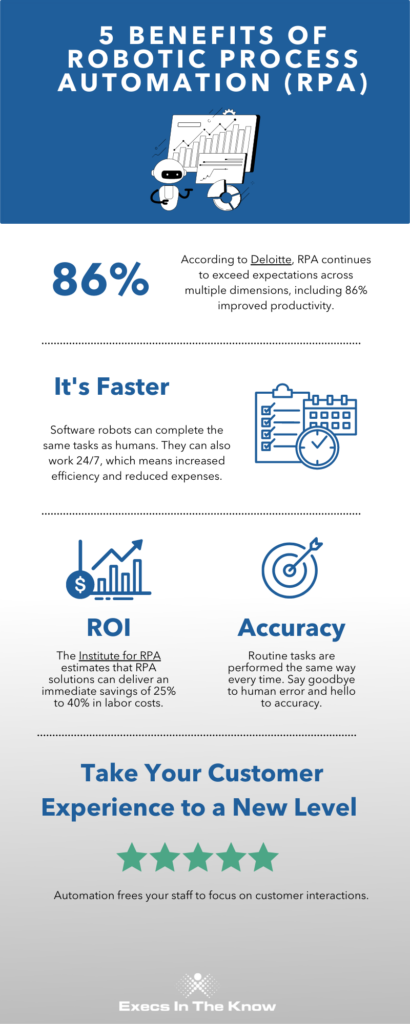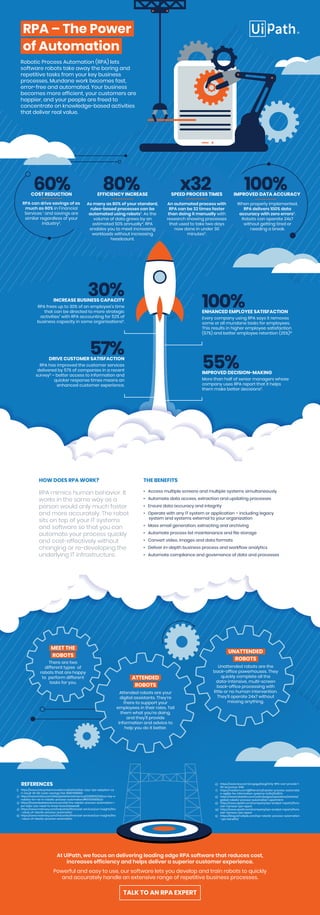Robotic Process Automation (RPA) has become a game changer in the business world, revolutionizing the way organizations streamline their operations. In this article, we will explore how Robotic Process Automation is transforming various business processes, increasing efficiency, accuracy, and productivity.
Enhancing Data Extraction and Entry
One of the key benefits of RPA is its ability to automate data extraction and entry tasks. Manual data extraction is prone to errors and can be time-consuming. With RPA, organizations can automate the extraction of data from various sources such as invoices, receipts, and documents, ensuring accuracy and speeding up the process.
Moreover, RPA can also automate data entry tasks, eliminating the need for employees to manually input data into systems. This significantly reduces the risk of human errors and allows employees to focus on higher-value activities.
Automating Repetitive Tasks
Mundane and repetitive tasks can eat up a significant portion of employees’ time and energy. RPA can help alleviate this burden by automating these tasks, freeing up employees to concentrate on more strategic and value-added activities.
Tasks such as data reconciliation, report generation, and invoice processing can be easily automated using RPA. By implementing RPA, organizations can achieve faster processing times, increased accuracy, and improved overall productivity.
Streamlining Customer Service
Customer service is a critical aspect of any business, and RPA can play a crucial role in streamlining customer service processes. By automating tasks such as ticket routing, email categorization, and response generation, RPA can ensure faster and more accurate customer service.

Image courtesy of execsintheknow.com via Google Images
RPA-powered chatbots and voice assistants can provide timely and accurate customer support, reducing the need for customers to wait for a human representative. This not only enhances customer satisfaction but also allows customer service teams to handle more complex issues.
Accelerating Finance and Accounting Functions
Finance and accounting processes are often complex and time-consuming. With RPA, organizations can accelerate these functions and improve efficiency while reducing the likelihood of errors.
RPA can automate tasks such as accounts payable/receivable, payroll processing, and financial reporting. By automating these processes, organizations can achieve higher accuracy, faster processing times, and seamless integration with existing systems.
Ensuring Compliance and Risk Management
Businesses today face increasing regulatory and compliance challenges. RPA can help organizations ensure compliance by automating checks, reconciliations, and strict adherence to regulations.

Image courtesy of www.slideshare.net via Google Images
RPA can also aid in risk management by identifying potential risks and taking proactive measures to mitigate them. By automating risk assessment processes, organizations can reduce potential losses and ensure a more secure and compliant environment.
In Conclusion
Robotic Process Automation is transforming business processes on multiple fronts, revolutionizing how organizations operate. By enhancing data extraction and entry, automating repetitive tasks, streamlining customer service, accelerating finance and accounting functions, and ensuring compliance and risk management, RPA is increasing efficiency, accuracy, and productivity.
The benefits of RPA include improved operational efficiency, reduced errors, increased employee satisfaction, and enhanced customer service. As technology evolves, the potential for further advancements in automation and RPA is vast. Businesses that embrace RPA can stay ahead of the competition and unlock the full potential of automation in their processes.



